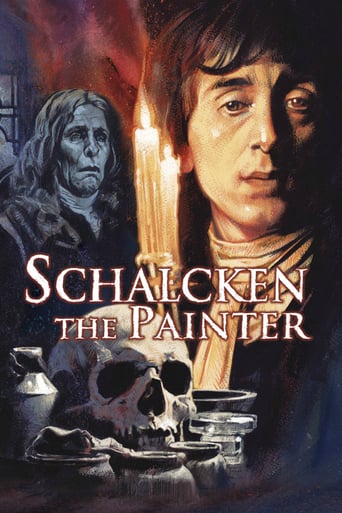begob
The young lover of a student artist in 17th century Holland is spirited away in marriage by her guardian to a grim, wealthy suitor. Years pass, and the student becomes successful, but then he finds her again ...A strange, cold story, with a fabulously eerie climax. Shot with all eyes on recreating the image of Dutch interiors, still lifes and portraits from the era, and very spare with the dialogue. I did feel the lovers' relationship should have been given more substance, but the performances are excellent, and the psychology of the protagonist is deep and not easy to understand. The outstanding theme is the treatment of women as objects, but the message is complex and rounded out with inevitable terror as life's betrayals and compromises accumulate.Pace is a little slow and solemn. Music is harpsichord, sometimes contrasting in mood with what's on screen.Overall, very interesting and the scene in the vault is a good 'un.
steve-2186
I saw it and taped it when it went out and have never forgotten it. Sadly that was on Betamax in a former life. I agree entirely with everyone's observations on the piece.And I have seen the original painting. Many years ago I was stood in the doorway of a huge room in an English stately home, listening to the information being given by the guide when I casually glanced to my left.This was a very warm summer's day but my blood froze. I was resting against a wall covered in paintings and there next to my left elbow was the very painting of the girl shielding the candle, with her ghastly suitor's face in the shadows...I can't remember which house it was though it might have been Woodstock near Oxford. But I will never forget that shock! The piece, from the Omnibus series, does still exist as a print so there is still hope...
stephen-lambe
There's no point repeating what other viewers have said - this is one of the great lost classics of BBC television.A stunning piece of work, and the climactic scene is both erotic and horrific.It may not originally have been "A Ghost Story for Christmas", but I'm sure it was shown in that slot at some point in the 80s.There was a companion piece made in 1987 - again with Charles Gray as narrator - this time based on an incident the life of Italian painter Cariani. It was called Cariani and the Courtesans, and starred a pre-Withnail Paul McGann.It lacks the atmosphere or the horror of the earlier piece, but it's worth a look if the chance ever presents itself.
ianmw
"Schalken the Painter", to my memory, was first shown in December 1979 during the BBC2 drama schedule. I believe it may have been shown a second time in 1980 and again in the late 80s (although I missed both the repeats). Aged just 13 at the time, I remember the play had long lasting effects and it wasn't until a few years later when I rediscovered many works in the UK by Schalcken, that I realised the brilliant work by the Le Fanu in reworking a dark and mysterious painting. This play recorded for TV is a masterful work and the transfer to DVD must surely come.Does anyone know the exact painting that influenced the play/film and where it is displayed? (I haven't tracked it down in the 26 years that has elapsed!).I remember the first broadcast coming at the end of BBC2's evening schedule of programmes and the announcer alerting the viewer of some scenes may cause some viewers a little distress (such was the politeness of the BBC announcer at the time!).Whilst we know of the supernatural and mainly inaccurate account as dramatised by Le Fanu, it is nonetheless made all the more pointing bearing in mind how little we actually know of the Dutch 17th Century Genre Painters of which our hero Schalcken was a leading Leiden fine-painter.Given the incredible attention to Vermeer in recent years and indeed the rise in popularity of 17th Century Dutch painters, it is appropriate for the BBC to go in search of this wonderful eerie drama first broadcast in 1979, show again (perhaps on BBC4 as this is their preferred artistic channel), and finally (PLEASE PLEASE) release on DVD.The acting is superlative, the dramatisation is spot-on, and Schalken (correct spelling is Schalcken, though not used in the play or film) is portrayed as our hero destined for total emotional collapse. The narrator in the end, gives the viewer a choice. He says that Schalken does not recover and is left mourning the loss of Rose - or does he? If you haven't discovered any of Schalcken's other works, the UK have a great many of them.



